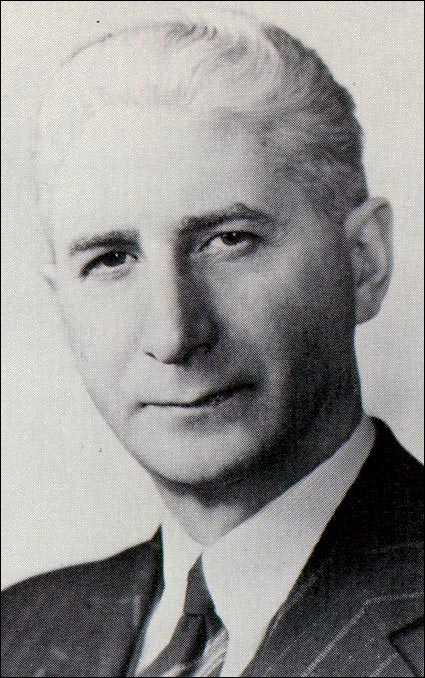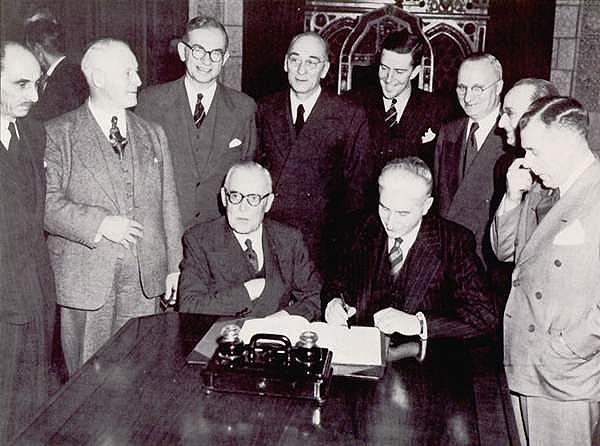Becoming a Province
After a short period of hesitation, the Canadian government decided to accept the result of the 1948 referendum, and enter into formal negotiations with an authorized delegation from Newfoundland. Once agreed, the terms of union would be approved by the Canadian government and the Commission of Government. The British parliament would then amend the British North America [BNA] Act.
The Newfoundland delegation was led by Albert Walsh, one of the Newfoundland members of the Commission.

It included the confederate leaders, Joseph Smallwood and Gordon Bradley, and the last chairman of the Convention, John McEvoy. The business sector was represented by Philip Gruchy, manager of the paper mill at Grand Falls, Chesley Crosbie and Gordon Winter. After numerous preliminary meetings, the delegation left for Ottawa on 6 October, 1948.
The basis of negotiation were the draft terms of union worked out in 1947. However, the delegation wanted a better financial deal, and this proved to be an area of serious difficulty. Finally, the Canadian government agreed to significantly increase the 12-year transitional grant. There were also difficulties over fisheries administration. The final terms were signed on 11 December by all except Crosbie, who thought the financial arrangements were unsatisfactory.

Responsible Government Petition
In St. John's, diehard anti-confederates tried to stop the process. A petition sponsored by the responsible Government League calling for a return to responsible government gathered 50,000 signatures. Major Peter Cashin and others took it to London, hoping to influence British parliamentarians, but it had little or no effect. A second tactic was a court action against the Commission of Government, claiming that the legislation authorizing both the National Convention and the referendums were unconstitutional, and that confederation could only be brought about by an elected legislature. The action was thrown out.
By 17 February 1949 the Canadian parliament had given its consent. The Commission of Government followed, and on 22 February debate began in the British parliament. The legislation passed its final stages in late March.
Governing the New Province
Meanwhile, there had been considerable discussion about how the new province should be governed between the date of union - set for 31 March - and the first provincial election. After many consultations, the Canadian government (now led by Louis St. Laurent) appointed Walsh as the first lieutenant-governor. It was understood that he would in turn invite Smallwood to form an interim government. Bradley would receive a position in the federal cabinet.
Thus on 1 April 1949, Walsh swore in Smallwood and his cabinet. On Parliament Hill in Ottawa, Bradley was sworn in as Secretary of State. "This is a day which will live long in North American history", he said.
It is a day of fulfilment - fulfilment of a vision of great men who planned the nation of Canada more than 80 years ago; and as we stand here on this day of destiny, our thoughts fly back through the years to those far-seeing men of the past - Macdonald, Brown and Cartier in Canada and Carter and Shea in Newfoundland .... In fancy we see them now, bending over this scene in silent and profound approval .... Thus we begin life as one people in an atmosphere of unity. We are all Canadians now ....
Published Lament
But the events of the previous three and a half years had been deeply divisive in Newfoundland, where many were saddened and embittered by the outcome. The journalist Albert Perlin published a lament in the St. John's Daily News which expressed these feelings:
On this day of final parting sad nostalgic
thoughts arise,
Thoughts to bring hot tears surging to the
Newfoundlander's eyes.
Thoughts that bring to mind the story of the
struggles of the past,
Of the men who built our island, nailed its colours to
the mast.
..........
Sold by only half the people, all too willing
to deny
For illusionary profits what the future might
imply.
They have bought confederation paying in the
country's pride.
Let us hope their expectations will be amply
satisfied.
Those who lost the fight for freedom have the
greater pride this day,
Though their country's independence lies the victim
of the fray.
This division was to shape the future of Newfoundland and Labrador as a province, and discussion over the events of the 1940s will probably never end.




